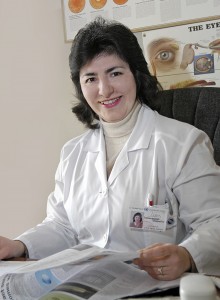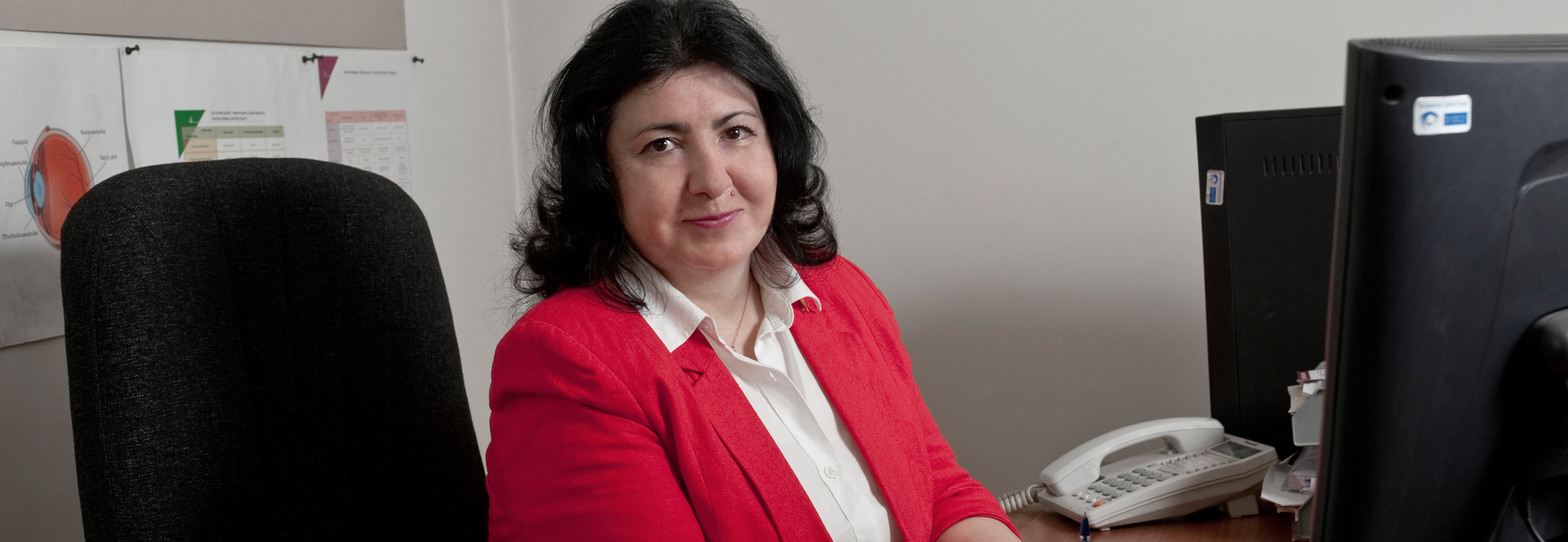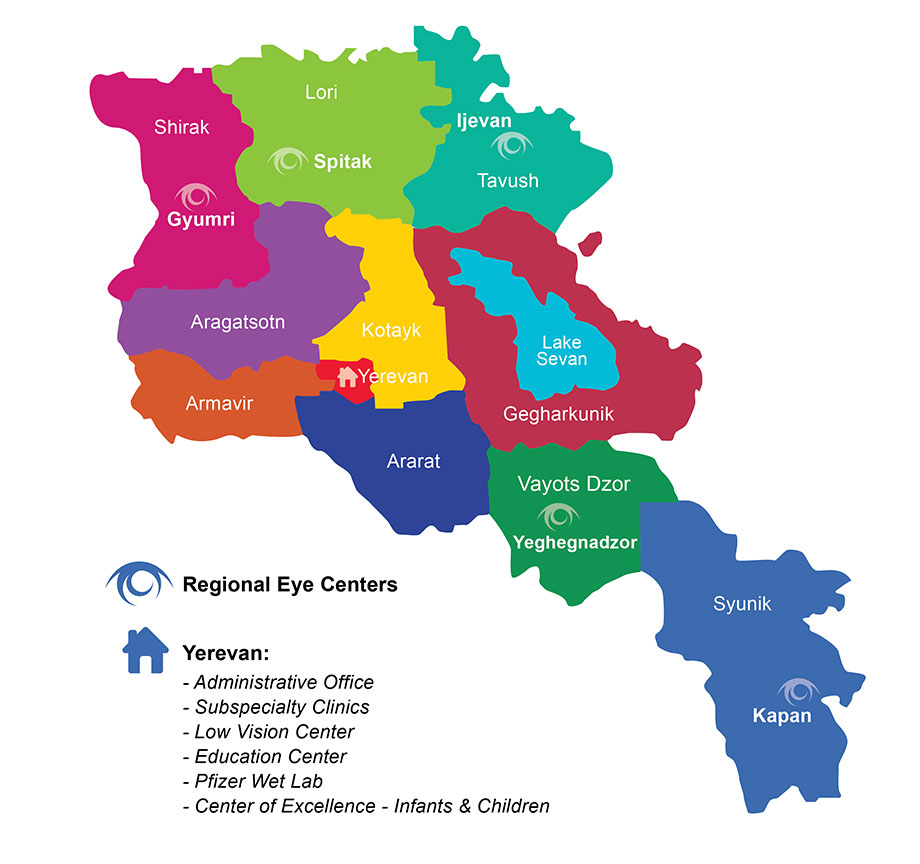TEACHER, SURGEON, RESEARCHER

As a young girl, Marianne Shahsuvaryan was attracted to the medical profession by her family—her mother, an ophthalmologist; two aunts, a hematologist and microbiologist; her grandfather, an infectionist; and her grandmother, a therapeutist.
Shahsuvaryan, who chose to follow in her mother’s footsteps as an ophthalmologist, said, “Practicing ophthalmology is a privilege, and ophthalmologists are intimately familiar with the rewards and personal satisfaction their efforts bring. It combines medical therapy and surgery.”
As AECP’s Medical Training Director, an Associate Professor and Chair of Ophthalmology at Yerevan State Medical University, and an Ophthalmologist at the Malayan Ophthalmologic Center, Shahsuvaryan combines teaching, training, surgery and research.
As an ophthalmologist, she sees 15-20 patients each day; as a surgeon, she performs three operations per week. In her role as associate professor, Shahsuvaryan works with ophthalmology residents. In her AECP role, she prepares material for health care personnel.
“The most challenging thing about it all is to combine it all and do it all the best way,” she said.
Doing it all the best way involves a busy morning filled with seeing patients and discussing each case with residents. A “typical” afternoon includes performing surgery and preparing charts for the Primary Health Care manual.
As AECP’s Medical Training Director, a position she assumed in December 2004, Shahsuvaryan’s responsibilities include implementing the USAID/AECP Global Development Alliance Program in the medical education and training arena. The program includes a $750,000 grant from the United States Agency for International Development to integrate primary and ophthalmologic health care in Armenia.
“My experience as a researcher and trainer helps me in the development of training modules for ophthalmologists and health care personnel at the Primary Health Care (PHC) level,” she explained. “Seminars in ophthalmology for health care personnel at the PHC level will provide the necessary knowledge and skills to diagnose, treat (in special cases) or refer patients with ocular problems.”
In addition, “An important aspect of my work is analyzing and assessing the country environment in view of general ophthalmic education,” she explained.
To identify areas for AECP involvement in training, the eye care organization maintains continuous dialogue with its partners.
“For me, it means a lot of research, negotiation and learning in joint design of action plans, the establishment of common monitoring and evaluation mechanisms,” she said.
Consequently, after consulting with the AECP, its U.S. colleagues and with “valuable input” from AECP doctors, Shahsuvaryan has developed case definitions and management approaches for discussion with specialists. These approaches will serve as the basis for the ophthalmologic training curriculum.
“The curriculum will have a strong focus on simple eye care for primary health care workers, with educational materials that will include key messages on eye emergencies as well as practical ophthalmic procedures—all that they need to know in their daily work,” she said.
As a teacher and trainer, Shahsuvaryan shares her knowledge with others, yet knowledge is important for her own professional development as well.
“I am eager to learn. Permanent self-education allows me to treat patients based on modern scientific findings and technologies, and to share my knowledge with colleagues,” she said.
All of Shahsuvaryan’s roles are rewarding. As an associate professor, she enjoys sharing her knowledge and skills with medical students. As AECP’s medical training coordinator, she enjoys working with residents and primarily health care personnel. As an ophthalmologist, she finds “great satisfaction” in helping patients and restoring their vision.
Her favorite patient was an elderly man who was nearly blind from bilateral cataracts. After the operation, “The patient was happy. I was happy with the results of my first cataract extraction. It was exciting for the patient and for me.”
At a young age, Shahsuvaryan shared the excitement of eye surgery through the experiences of her mother, Svetlana Bakhshinova, an Associate Professor in the Department of Ophthalmology at the National Institute of Health in Yerevan. (Her father, Levon Shahsuvaryan, an engineer and specialist in constructing earthquake-safe buildings, died in 1999.)
Born in Yerevan in 1966, Shahsuvaryan, an only child, enjoyed drawing, knitting, crocheting, macramé, writing poetry and stories. She was influenced in her career choice by her mother, grandparents and aunts—all medical professionals.
“From early childhood, I was attracted by medicine due to the specific atmosphere created by my relatives,” she explained. “I became an ophthalmologist like my mother.”
Shahsuvaryan graduated from Yerevan State Medical University. Then she completed her residency at Central Physicians Advancing Training Institute in Moscow, Russia.
When she is not working, Shahsuvaryan enjoys playing billiards and reading. Her favorite book is Lofty and Terrestrial by David Weiss.
As AECP’s Medical Training Director, Shahsuvaryan hopes to accomplish many goals. They include helping to improve the skills of primary care physicians—including family medicine doctors in ophthalmology—and helping to control common illnesses that cause eye disease and blindness in Armenia. She believes these goals will be achieved through continuing education programs that will become part of the standard educational curricula.
“I hope we will be able to change the focus from curative to preventive care at the primary health care level through early intervention strategies by physicians to increase control of eye diseases and their precipitating illnesses,” Shahsuvaryan explained.
“Prevention works best when it is introduced from the Primary Health Care level. All this will eventually contribute to AECP’s larger mission—to eliminate preventable blindness in Armenia.”







